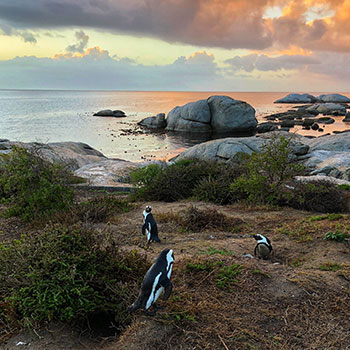Ecology
Sciences & the Environment Program
Cape Town, South Africa
Dates: early Feb 2022 - early Jun 2022

Ecology
OVERVIEW
CEA CAPA Partner Institution: University of Cape Town
Location: Cape Town, South Africa
Primary Subject Area: Ecology
Instruction in: English
Course Code: BIO2010F
Transcript Source: Partner Institution
Course Details: Level 200
Recommended Semester Credits: 8
DESCRIPTION
This course concerns advanced topics in African terrestrial ecology. We span variation in scale, from local community ecology (such as of freshwaters) to ecosystem ecology (such as the dynamics of fynbos, forest and savanna). We focus on plants and animals, as well as their interactions. Important environmental factors (such as soil, climate and water) are also considered. Some further topics that are dealt with are biogeochemistry (from geology and nutrients to plant and animal distributions), disturbance and succession (such as the role of fire and herbivory), patterns and causes of animal and plant distributions and of species richness. The course is fieldwork-orientated with a two-week fieldtrip before the first semester starts. This provides ample opportunity for lectures as well as studying plants, animals, their interactions and the role of local environments. During the rest of the semester emphasis is placed on completing practical assignments, with only a limited number of lectures/tutorials.
DP requirements: A minimum of 40% for class record, attendance of two week field camp.
Assessment: A 3-hour examination written in June will count for 50% of the course with a subminimum of 40%. Coursework marks will be allocated as follows: Practical and project work counts 40%; one class test counts 10%.
The University of Cape Town awards credits based on the National Qualifications Framework (NQF) to determine course and contact hour recommendations per course. 1 NQF credit represents roughly 10 notional hours of work which includes study time, assignments and examinations. Notional hours may very per courses depending on the course level and modality therefore, CEA recommends using NQF credits as a basis to determine U.S. equivalencies (1 NQF=.222 semester credits)
DP requirements: A minimum of 40% for class record, attendance of two week field camp.
Assessment: A 3-hour examination written in June will count for 50% of the course with a subminimum of 40%. Coursework marks will be allocated as follows: Practical and project work counts 40%; one class test counts 10%.
The University of Cape Town awards credits based on the National Qualifications Framework (NQF) to determine course and contact hour recommendations per course. 1 NQF credit represents roughly 10 notional hours of work which includes study time, assignments and examinations. Notional hours may very per courses depending on the course level and modality therefore, CEA recommends using NQF credits as a basis to determine U.S. equivalencies (1 NQF=.222 semester credits)










